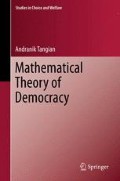Abstract
Four simple applications of the formulas derived in the book are considered. The first application illustrates Theorem 4.14 from Section 4.8 about the convergence of the Borda and Condorcet counts as the size of the electorate increases. This application is aimed at planning a public opinion poll for ranking several options (like the candidates for election) with no cyclic majorities. Three other applications are based on formulas from Theorems 6.4 and 6.6 from Sections 6.4 and 6.5. One application deals with planing a public opinion poll with expected and guaranteed levels of representativeness. The other application describes how to plan a TV round table with invitees ‘from the street’, where the public opinion on each of several issues will be represented by at least one invitee. The last application discusses man’s ability to make complex decisions by focusing on seven to ten criteria instead of considering all available information. This is explained by the analogy between selections of criteria and representative bodies that make adequate decisions on behalf of the whole society. In particular, it is concluded that complex problems can often be analyzed with small models, and additional extensions bring much less gain than usually hoped for.
Knowing is not enough, we must apply. Willing is not enough, we must do.
Johann Wolfgang von Goethe (1749–1832)
Access this chapter
Tax calculation will be finalised at checkout
Purchases are for personal use only
Preview
Unable to display preview. Download preview PDF.
References
Four temperaments (2012).Wikipedia.http://en.wikipedia.org/wiki/Four temperaments. Cited 14 Apr 2013
Larichev OI (1979) Science and art of decision making. Nauka,Moscow (Russian)
Tangian A (1997) An outline of the mathematical theory of democracyand its applications. Group Decision and Negotiation 6(3):205–230
Tangian A (2000) Unlikelihood of Condorcet’s paradox in a largesociety. Soc Choice Welf 17: 337–365
Three-sigma rule (2012).Wikipedia.http://en.wikipedia.org/wiki/68-95-99.7 rule. Cited 14 Apr 2013
Author information
Authors and Affiliations
Rights and permissions
Copyright information
© 2014 Springer-Verlag Berlin Heidelberg
About this chapter
Cite this chapter
Tangian, A. (2014). Simple Applications. In: Mathematical Theory of Democracy. Studies in Choice and Welfare. Springer, Berlin, Heidelberg. https://doi.org/10.1007/978-3-642-38724-1_11
Download citation
DOI: https://doi.org/10.1007/978-3-642-38724-1_11
Published:
Publisher Name: Springer, Berlin, Heidelberg
Print ISBN: 978-3-642-38723-4
Online ISBN: 978-3-642-38724-1
eBook Packages: Business and EconomicsEconomics and Finance (R0)

